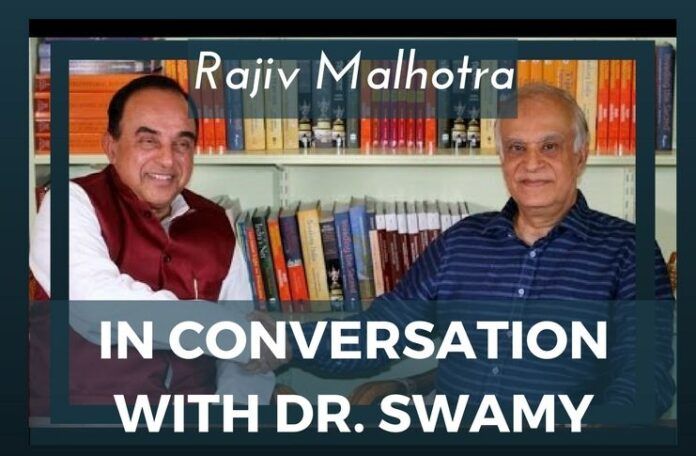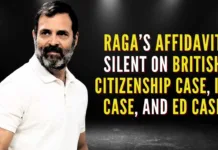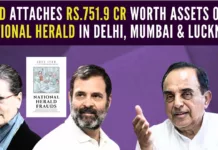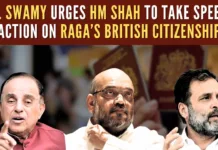
Rajiv Malhotra: Namaste! I have a very distinguished guest today, Dr Subramanian Swamy. Namaskar to you and welcome. It has always been a delight to interact and discuss with you. My followers are always excited and energised when we both talk.
Dr Subramanian Swamy: Likewise, with you.
Rajiv Malhotra: Every time I see you, you have done so much more. I think it is good to start with an update. NDTV is in the news, tell us about it.
Dr Subramanian Swamy: We owe it to an income tax official who had investigated and stumbled upon some conflict of interest issues and made out a case. His senior officers agreed and the Income Tax Department had issued a notice to the NDTV. It was then that Prannoy Roy and others in NDTV approached Mr Chidambaram (former finance minister of India). In this process, they not only tried to rubbish the reputation of the officer but also contrived to see that he is declared as insane by the High Court based on false data. The officer may have been indiscreet in one or two remarks and they took advantage of that.
The officer was finally removed from service and everybody forgot about it. I think Mr Jethmalani and Mr Gurumurty initially had an interest in following the case but even they seem to have lost interest in it because perhaps they felt they had run against a wall. This was the case even when the BJP came to power. Sometime in last about four to five months, I came across the entire file of the officer, Mr Shrivastava. His friends approached me saying that great injustice has been done to him. I must say to the credit of our Prime Minister that when he heard about the unfair treatment meted out to Shrivastava, he had him fully reinstated with all the honours in the Finance Ministry despite the resistance of the senior bureaucrats of that ministry who are still loyal to Chidambaram.
After the officer got back his job, I wrote a letter to the Prime Minister saying that it is very shocking that such a horrendous money laundering operation has taken place under innocent and innocuous looking heads, and that this has to be investigated. And the Prime Minister’s Office must have ensured that the heads of the Enforcement Directorate and CBI know that the government has no view on it and they must proceed ahead according to law. Then we had a change of head in the CBI, a very upright officer Alok Verma became the director and so too did the ED get very upright officers. This is an example of what wonders upright officers can do and why we should preserve, promote and nourish them. Immediately the process of the law started, more material is coming out because the recent raid has led to the disclosure of many more money laundering operations. The undisclosed wealth of Mr Roy is another big issue. It is not an issue of freedom of the press at all as they are making it out to be because nobody is above the law. One can be a high official of the government and still be subject to the anti-corruption laws and the criminal code of the country. That is why we cannot make an exception on this. This is why I think we have done something which is very courageous and I have to thank our government for letting the matter proceed to its logical end.
Rajiv Malhotra: Is this one case of an isolated bad guy or two people or is this going to be about opening up the bigger issue about media, its corruption linked with government, and so on?
Dr Subramanian Swamy: I think we have to get to that because the media has been corrupted over the years when there was a promiscuous atmosphere and corruption was, part of the system. Corruption was also part of the necessary tools of survival in high society. These things were going on with impunity. In the case of the NDTV, there was an officer who had stumbled upon the whole matter. So, the background was ready.
Rajiv Malhotra: But will there be much more?
Dr Subramanian Swamy: There will be much more. We have to sooner or later get to them.
Rajiv Malhotra: Because it seems that the media has a clout that gives the media people leverage over the government, whom they get elected, whom they expose and whom they don’t expose and it is some sort of weapon that can be bargained.
Dr. Subramanian Swamy: Yes absolutely! I think many politicians are very unhappy that we are pursuing the NDTV case but unfortunately, it doesn’t take more than two to three people who are absolutely beyond blackmail. We have a Prime Minister who is determined to fight corruption.
Rajiv Malhotra: There could also be other corrupt people in the media who represent industrial groups and help them negotiate with government agencies and help them gain the advantage.
Dr Subramanian Swamy: That is right! We have evidence of media people sitting with ministers on appointments and postings and so on. This is an incestuous relationship.
Rajiv Malhotra: I think that the claim that these people constitute an innocent free press and the authorities are after them has to be punctured.
Dr Subramanian Swamy: Yes absolutely. They have to be put on notice that they too are accountable.
Rajiv Malhotra: In one of the Swadeshi Indology conferences in the future, we should address the media problem. It should be a conference dedicated to this issue and address questions such as: What is going on? A structure of the media, who funds it and so on. Get scholars who are experts on media and publish their views. We have to use publications and good media as a vehicle to undermine the bad media.
Dr Subramanian Swamy: That is right! We must be able to show that the media, particularly the English media has been part of an agenda of the foreigners. Many don’t realise it, many may be unwittingly doing it, but the fact is that they are furthering the agenda of the foreigners.
Rajiv Malhotra: What about Chidambaram? There are these cases on Chidambaram and it is always a delight to know more what is going on.
Dr Subramanian Swamy: Mr Chidambaram had a very narrow escape when I was pursuing the 2G spectrum scam case. Actually, the records show that A Raja (the then telecom minister) took advice from Chidambaram and there are minutes of the meeting between Raja and Mr Chidambaram. Mr Chidambaram educated him how to do the whole operation. But the UPA was in power, and Chidambaram was alternatively Finance Minister and Home Minister. So, it was getting very difficult to actually nail him in the case.
But as we began approaching 2014, I could get more material with ease. That led me to the Aircel Maxis matter. This is an open shut case because the foreign direct investment rules say that no foreign company can buy more than 74% of the shares of an Indian telecom company. Chidambaram knowing the law fully well still gave permission to a Malaysian company to acquire 100 %. The way they did it was to create a benaami Indian company which bought the 26%. But they were so brazen that the benaami Indian company financed the purchase of 26% through a subsidiary of the company with 74% stake (Maxis).
This was just hubris. Firstly that Mr Chidambaram gave clearance to the Malaysian company is an offence by itself. In addition, it is enough for the Prevention of Corruption Act to come into operation if he was responsible for the Malaysian company benefiting. Even his son got large sums in commissions which are being documented now.
The second thing that was more outrageous was the flouting of the rule which doesn’t allow Mr Chidambaram as the head of the Foreign Investment Promotion Board to approve any project which was more than 600 crores in investment. This approval was of 4000 crores. Therefore, he ought to have referred it to Cabinet Committee of Economic Affairs and he did not do so. The reason he probably didn’t do this is the sub-committee of the cabinet would have mandatorily referred it to security clearance. The security clearance check would have shown that 25 % of the shares of the apparent company Maxis in Malaysia was owned by Saudi Arabian telecom which had a partnership with Pakistan and would have meant that Pakistani people would have come to India if security clearance would have been given. For a bribe, he violated the law.
Rajiv Malhotra: He also put the national security under threat
Dr Subramanian Swamy: Yes, he put the national security on a threat. In the INX matter which is quite silly, he gave a clearance of 3 crores and then finally, the letter was given 400 crores. More importantly, in every Foreign Investment Promotion Board clearance approval given by Mr Chidambaram, his son got money in his consulting companies.
Rajiv Malhotra: What is the due process required to get him?
Dr Subramanian Swamy: Now there is a FIR registered against him, and his home has been raided, his son has been interrogated, Mr Chidambaram is bound to be interrogated very soon. After that, a charge sheet will be filed and the court will examine whether they should proceed ahead. In which case the lawyers of Mr Chidambaram and Karti will get an opportunity to debunk these charges and then the charges will be framed which I think in this case is an open and shut. Then the trial will begin and I think in a period of 2 years they should be in Tihar jail.
Rajiv Malhotra: You are very persistent and I must say that you combine many skills: intelligence, persistence, selflessness, the pursuit of truth to the end. You also lack fear which stems from a pursuit of truth. The other case that you have pursued is the one against Sonia Gandhi. Where do things stand on that?
Dr Subramanian Swamy: What happened there was that I had proved that there was the prima facie case of cheating, a criminal misappropriation of property and criminal breach of trust and therefore the summons was issued. They were arrested in the court but since I did not object to their getting bail, they got bail for INR 50,000 bond and surety of Mr Anthony in the case of Sonia Gandhi and Priyanka Gandhi, and Rahul Gandhi and they were let out on bail.
Rajiv Malhotra: So, technically they are arrested people out on bail.
Dr Subramanian Swamy: Yes. One cannot be on bail unless one is arrested. They were made to stand like any other accused in the open court. The fact that such big people had to stand like anybody else had an electrifying effect on the people. Now the trial has to begin and the court has to determine whether the trial is worth going forward, whether the material is substantive for conducting a trial which will lead to prosecution and conviction.
In our CrPC, which is the Criminal Procedure Code, there is an important provision which says that you can ask the court to summon those documents that are not personal to the accused i.e. the accused should not be able to damn himself or herself. The National Herald case is based on documents. The document is that a company was formed with Sonia Gandhi and Rahul Gandhi owning 76% shares and now it is gone up to 81. They gave INR 50 lakh to the Congress party to transfer or assign the debt owned by the National Herald Company, Associate Journals of INR 90 crores to them on the grounds that INR 50 lakh is better than nothing and this is a loan that cannot be recovered.
Therefore I have asked for documents which will answer questions such as: Where did you get the 50 lakhs when your own company is only 5 lakhs paid up capital? It turns out it has been got by money laundering and it has been established. Where did you deposit in the Congress budget? Please give me the documents of the budget so I can see that actually it has been deposited. Furthermore, you say that you have assigned it, let us find out whether the Associated Journals actually got 90 crores loan from the Congress Party. Where did you put it in the newspaper’s accounts?
Rajiv Malhotra: If it was given it has to be received.
Dr Subramanian Swamy: Yes! It is also the case that if one would have converted the 90 crores into 9 crores shares worth INR 10 a share that was the price when it was constituted and incorporated in 1937. Was a shared analysis done to find the current worth of the shares? They have got 5,000 crores worth of property now.
Rajiv Malhotra: Robbers with convoluted deals!
Dr Subramanian Swamy: That is right! So, these are all the documents I am expecting them to deliver on the 1st of July.
Rajiv Malhotra: This is very strategic in the development of India as a nation: to clean up all this mess to make it a robust country, a state and people who are accountable. It is so important.
Dr Subramanian Swamy: Now, I believe that in India if one can catch a few people at the top and send them to jail, by example and fear, everybody will become honest.
Rajiv Malhotra: Some top politicians, a few top industrialists a few media-persons, all these guys have to go to jail. That would be amazing work. What is the situation on black money which is overseas? That was a big campaign promise and everybody hoped it would happen. Why hasn’t the new government done something?
Dr Subramanian Swamy: Both the Attorney General and the Finance Minister felt that we have to go through a certain procedure which I don’t agree with. They want to do it through bilateral negotiations and so on and I don’t think that approach will work. In fact, the Prime Minister asked me how would I do it and I have sent him four different ways in which it can be done. The first example is of the Germans. Chancellor Merkel found out that her officials had bank accounts in the Lichtenstein bank and asked the Lichtenstein government to hand it over the records. They refused to say that to be against principles of their business. So, then her government bribed the senior most financial officer of the bank and got the entire data downloaded. They found that the nationals of 22 countries had secret bank accounts in Lichtenstein Bank and India was one of them. She wrote to all of the countries offering them data and every country except India wrote to her asking for the CD / DVD. I and Ram Jethmalani had to go to Supreme Court and file a case which is still pending in the Supreme Court. The Supreme Court directed that those names be procured. That envelope with the names has still not been opened.
Rajiv Malhotra: That is unfortunate. But can that be pushed through the Right To Information?
Dr Subramanian Swamy: Now that the Attorney General has resigned and very often in these matters the Prime Minister is taking direct charge. So, the envelope will be opened. The second way is through the United Nation’s convention on corruption of 2005 which says that if a country formally by legislation, announces that it is nationalizing the accounts of all its citizens who have accounts in certain money laundering or secret banking countries, about 70 of them, then the United Nations will ensure that these countries hand over the entire bank account details such as money, names and so on. We need to pass a law in Parliament. We do not have a majority now but by April we will have a majority. There is the third way, the American way where they went and asked the local officials of the Washington branch of the Union Bank of Switzerland to hand over the names. The officials refused and they were arrested.
Rajiv Malhotra: Many years ago when I was in business I had an account with the Swiss Bank in New York. It was a legitimate and prestigious bank in the field of investment banking. In India, they think that having an account in a Swiss bank is illegal but in the United States they have branches in New York, San Francisco and so on and one just has to disclose it, like any other bank. Suddenly one day I got a call from the bank saying that the senior person in charge of my account would not be available anymore and that some other person has been assigned his job and he was coming to meet me. Later I found out that the senior person was placed in jail by the FBI. This was because they found out that he was violating US banking laws. What he used to do was to take deposits of investors such as me and loan them overnight for himself. At 5 PM when the bank closes it is still daylight in some other part of the world and he would lend the money there. The next morning by 9 AM the money would be back and he would never miss depositing it. He would loan it overnight to some other market and keep the interest for himself. When UBS and Swiss bank merged, they did an audit and the auditors caught this happening and that led to the arrest. The FBI not only threw him into jail but they threatened to jail all the officials. If they were to avoid arrest, they were to part with all the banking secrets. That is how they got all the banking secrets of all the Americans through the officials. This can be an example of what the Indian government ought to do.
Dr Subramanian Swamy: Absolutely! We also now have branches of say, Credit Suisse and so on.
Rajiv Malhotra: When they open a branch in India then it is good because you have some leverage over them. They are doing legitimate business, bringing investments and so on and therefore it is fine.
Dr Subramanian Swamy: I am sure that this black money will come back. Now that the decks have been cleared.
Rajiv Malhotra: In getting rid of Raghuraman Rajan (the former governor of Reserve bank of India), I remember the media coverage that you had a big role. Tell us how it happened because now many voices are coming out and saying that they are the ones who have done it. I want to hear from you what exactly happened that caused it.
Dr Subramanian Swamy: The reason I wanted him removed is that of the interest rates, which everybody feels is too high. I don’t know Raghuram Rajan personally and may have talked to him once or twice on phone. He was not, by the way, an economist but had done management after an IIT engineering degree. In management, one deals with two person transactions. Whereas the economy is a general equilibrium system. You do something in one place, it has an effect somewhere else. One has to have that kind of a vision, which Rajan didn’t have.
What he was doing was raising interest rates to control the inflation. Of course one could control inflation that way just as a doctor can bring the body temperature down by killing a patient! This is why I was objecting to his actions but he was absolutely drunk with his own power because Mr Chidambaram and Mr Jaitley were for him. What happened was that he was quite blasé and his term was coming to an end. I raised this matter with the Prime Minister, I wrote letters to the PM pointing out that (i) this is a disaster because small and medium industries are closing down because the cost of capital has gone up. One may bring down inflation by raising interest rates but then, it will lead to dead industries. (ii) He was also doing a lot of brokerages, which was illegal, to see that certain favours are given to certain companies. I think he had his brother in the Tatas and they worked in tandem to get the Finance Ministry to give out many concessions by threats. He was someone who appeared to be acting on the agenda of somebody else. That agenda was not any Indian’s agenda but a foreign agenda. He was also part of some group which has its main objective as protecting the American financial interests.
Rajiv Malhotra: In the US there was a hue and cry supporting him and opposing you and I was wondering well, who are these guys? Why are they bothered?
Dr Subramanian Swamy: That is right. It was none of their business. In fact, I think even the US president Mr Obama showed a great deal of interest in his continuing. I must say to the credit of the Prime Minister, once he was convinced, he decided one day that Rajan will go. I have known six or seven very personally and I don’t think any other Prime Minister has this man’s grit. The PM also told the Wall Street Journal it is none of their business because these are administrative matters. I was quite alone at that time because of the cacophony created by the media and the establishment and what we call as the Lutyens class. It was as if I was motivated by jealousy. Why would I have been motivated by jealousy? I didn’t want the job. Even society ladies such as Shobhaa De were intervening to speak for him.
Rajiv Malhotra: This is a very strange thing in India that there are these “society ladies”, “society type”, “Lodi Garden”, “Lodi Road”, “India International Centre” sort of people, they hang out in the Coffee shops of these organizations all the time, some of them are from the media and some are middlemen fixers. They really aren’t specialists in anything, but they want to be the brokers who involve in power, relationships and sleazy things all the time.
Dr Subramanian Swamy: Yes. Now the interesting thing is that the Finance Ministry is having a quarrel with the new Reserve Bank Governor for not lowering the interest rates. So, what I claimed against Rajan has now become the mainstream. Therefore many people might start claiming credit for the removal of Rajan.
The article is based on this ‘Video’
(To be Continued)
- Part 2: Discussion between Dr. Swamy and Rajiv Malhotra - September 10, 2017
- Dr Subramanian Swamy In Conversation with Rajiv Malhotra - July 24, 2017
- P2 – Discussing the Digestion of Yoga with a White Hindu - July 3, 2017











Two real great men of India talking. So nice to read and get confidence that India has sons to defend it always.